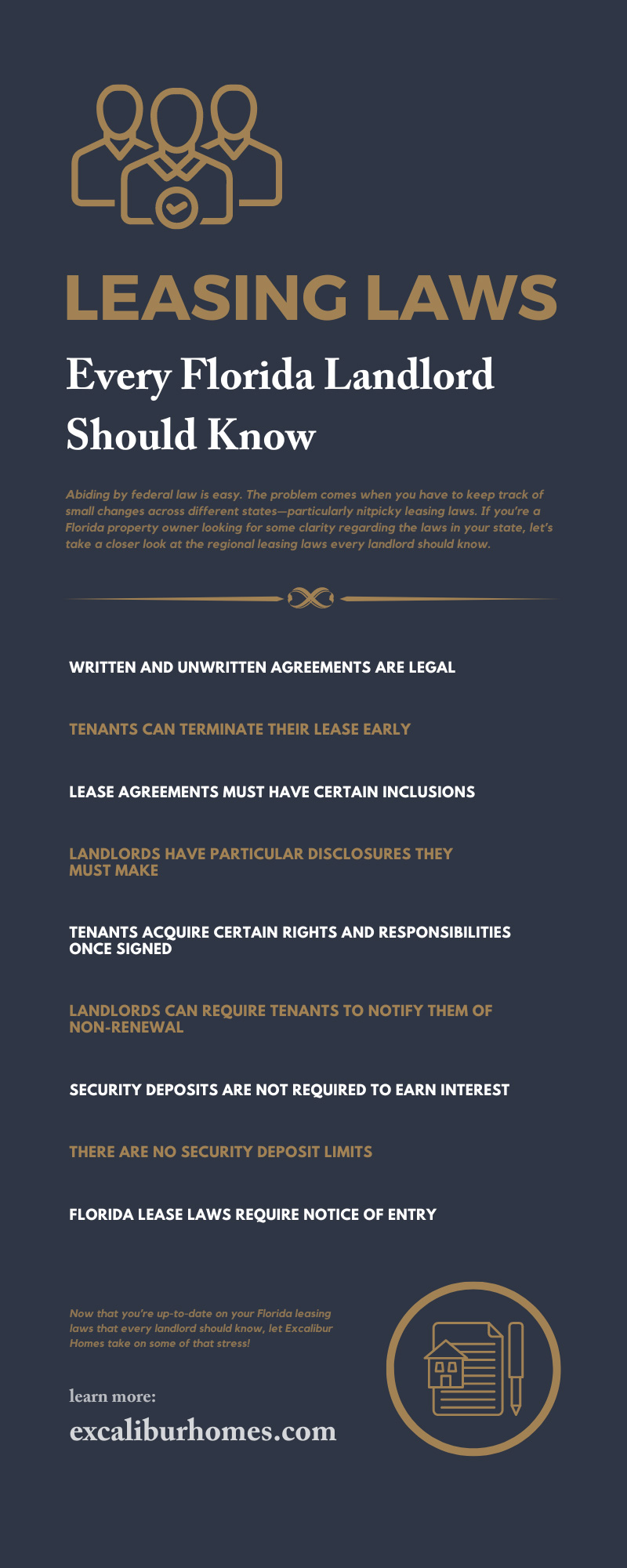
Every landlord of any level of experience knows how important it is to be aware of the law. An improperly worded clause or poorly phrased question can land you in some significant legal trouble. Abiding by federal law is easy. The problem comes when you have to keep track of small changes across different states—particularly nitpicky leasing laws. If you’re a Florida property owner looking for some clarity regarding the laws in your state, let’s take a closer look at the regional leasing laws every landlord should know.
Written and Unwritten Agreements Are Legal
While written lease agreements are ideal, in Florida, unwritten forms, such as oral agreements, can also be established and legally binding. This applies to weekly, monthly, quarterly, and even yearly leases. While this may be convenient for some, oral agreements are much harder to prove or dispute when disagreements arise, so you should always ensure that there’s some proof of the agreement and the conditions included.
Tenants Can Terminate Their Lease Early
In most states, tenants can terminate their lease early if the landlord doesn’t comply with the terms written in the agreement or if the property is uninhabitable. In Florida, however, things are a little different. A tenant can terminate the lease early without any legal penalty if there’s a privacy violation, an early lease termination clause, or if the tenant is relocating for active military duty. However, depending on the length of the lease, the notification window for early termination changes. A yearly lease needs a 2-month notification, a quarterly lease needs a 30-day notification, a monthly lease needs a 15-day notification, and a weekly lease needs a 7-day notification.
Lease Agreements Must Have Certain Inclusions
The details of a lease will always differ from landlord to landlord, but in Florida, there are particular inclusions that a landlord must have in their lease agreement. The lease must include a list of all people involved, renting and entry conditions, the lease’s duration dates, and policies regarding property damages or alterations. Unlike other states, Florida also requires that you have a security deposit explanation within the lease.
Landlords Have Particular Disclosures They Must Make
There are six major factors that landlords must disclose on the lease agreement if they apply to the property. If there’s lead-based paint or radon gas in or near the home, landlords must disclose that information. They must also disclose their age and identity and that of any agent they work with. Additionally, if the building is higher than three stories, tenants must know of available fire protections in place. Lastly, landlords must disclose whether they will hold the security deposit in an interest-bearing or non-interest-bearing account within 30 days of receiving the deposit.
Tenants Acquire Certain Rights and Responsibilities Once Signed
Just like in any other state, tenants take on certain rights and responsibilities once they sign the lease. Most of these rights are common across states, such as the right to privacy, the right to a proper eviction process, and the responsibility to keep the unit clean and pay rent. However, there are states that don’t make it a legal requirement for tenants to report maintenance issues, nor is the right to quiet enjoyment always written into law. Florida is not one of those states. In Florida, quiet enjoyment is a right. It’s also the tenant’s responsibility to report maintenance issues in a timely manner, and if it worsens due to negligence, they become legally responsible.
Landlords Can Require Tenants To Notify Them of Non-Renewal
In Florida, landlords can state in their lease agreement that the tenant must notify the landlord that they do not intend to renew their lease. Doing so allows landlords to get the jump on marketing and screening. However, the notification period can’t extend longer than 60 days. Additionally, if a tenant fails to give prior notice, they may legally have to cover any liquidated damages.
Security Deposits Are Not Required To Earn Interest
Even though landlords must disclose whether they intend to put the security deposit in an interest-bearing account, security deposits are not required to earn interest. However, if they do place it in an interest-bearing account, the landlord has one of two options. Either the tenant must receive 5 percent simple interest per year, or they must receive no less than 75 percent of the annual interest rate. Despite there being no law requiring interest, it may still be beneficial for the landlord to use it as an incentive when trying to acquire tenants.
There Are No Security Deposit Limits
On the topic of security deposits, you may have heard that Florida doesn’t have a state law regarding a security deposit limit—which is true! However, it’s possible that your county or city has a cap on the security deposit amounts, so be sure to reference your local tenant-landlord board. Even if there isn’t a local security deposit limit, you shouldn’t charge an exorbitant amount. If the deposit doesn’t reflect the property and rates you’re offering, prospective tenants may shy away from applying in the first place.
Florida Lease Laws Require Notice of Entry
Like most states, Florida requires that landlords provide their tenants with a certain amount of notice before they enter. The length of notice may change depending on the situation. For example, if there’s a maintenance issue, landlords must provide at least 24-hour notice before entering the property. However, in Florida, landlords can provide only 12-hour notice before, and that wouldn’t be a privacy violation. Although, this only applies to repairs. Other notices require at least 24 hours, and a landlord can enter without notice in a serious emergency.
Now that you’re up-to-date on your Florida leasing laws that every landlord should know, let Excalibur Homes take on some of that stress! As a Tampa, Florida, property management company, we know how hard it is to handle all of the responsibilities of being a landlord while staying informed on state laws. That’s why, when you work with us, we’ll pair you up with one of our knowledgeable and experienced property managers to help you tackle those day-to-day challenges and ensure that your business is legally abiding.



